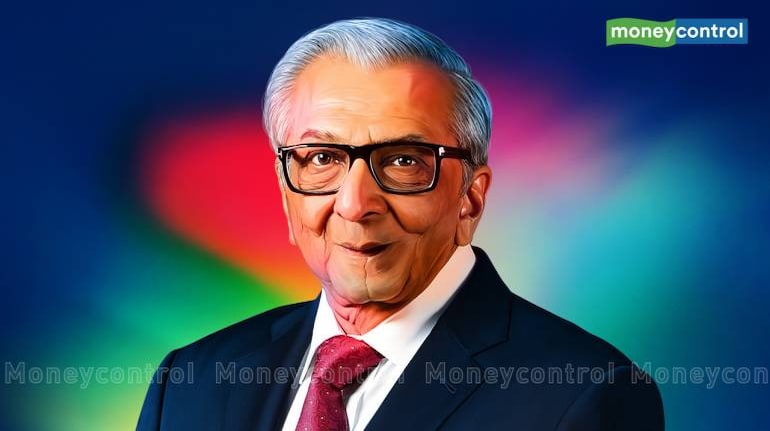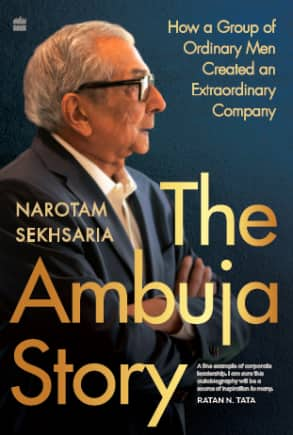



Note to readers:How do corporate leaders surf life after hanging up their boots? What do they do next? What are the lessons they learned in their eventful journeys? What advice do they have for the current crop of leaders? Veterans Unpacked is a new series of interviews aimed to offer readers lessons from retired bosses on life outside the corner office.
Narotam Sekhsaria is the founder and former CEO of Gujarat Ambuja (now Ambuja Cements), one of the largest cement manufacturers in the world.
 An entrepreneur who started his career in cotton trading, the Rajasthan native, went to college at Elphinstone and pursued a bachelor of chemical engineering degree at the University Department of Chemical Technology (UDCT). Sekhsaria is of that rare breed of entrepreneurs that believes in sharing the success of a venture with all its stakeholders. He has also endured personal trials that include battling aggressive cancer-related illnesses – and winning. He recently wrote a book on his life and times and how he built Ambuja Cements (The Ambuja Story: How a Group of Ordinary Men Created an Extraordinary Company, 2021).
An entrepreneur who started his career in cotton trading, the Rajasthan native, went to college at Elphinstone and pursued a bachelor of chemical engineering degree at the University Department of Chemical Technology (UDCT). Sekhsaria is of that rare breed of entrepreneurs that believes in sharing the success of a venture with all its stakeholders. He has also endured personal trials that include battling aggressive cancer-related illnesses – and winning. He recently wrote a book on his life and times and how he built Ambuja Cements (The Ambuja Story: How a Group of Ordinary Men Created an Extraordinary Company, 2021).
Also read: Narotam Sekhsaria: "I was determined to get ACC back on the rails in as short a period as possible"
Sekhsaria is one of the earliest promoters to have set up his own family office which has been an active and progressive investor-run new-age business. He also spends significant time supporting trusts and charities that help the underprivileged and under-served areas.
Edited excerpts from a Veterans Unpacked interview with Sekhsaria, on life after retirement:
What have been up to since hanging your boots?I am extremely busy doing different things. My two areas of focus these days are our Family Office (FO) related affairs and our philanthropies.
We were among the earliest to set up an FO in India, and that takes up a lot of my time. In the last 15 years, we have built teams for investments in a variety of areas like equity markets, private equity, money markets. And then there are associated activities like legal, compliance, accounting, and monitoring what is happening in the corporate world.
I still read a lot to evaluate opportunities in different sectors, and different companies within the sector. For me, cement was one learning, and now I am constantly learning about the world of investment and how to manage wealth and create appropriate returns.
Our social activities are the other equally important part of what I do on a daily basis. I still enjoy overseeing the work of Ambuja Cement Foundation, which over the years has grown to become one of the country’s largest CSR (corporate social responsibility) operations. Then there is the Salaam Bombay Foundation and Narotam Sekhsaria Foundation.
We are constantly looking at how we can make a bigger and better impact in the lives of those who are in need. One area that we are now closely looking at is how to help children who graduate from college and make them capable of either taking up a job or self-employment and help them grow. The opportunities are immense, but we need to prepare them for it.
One thing I learnt in the last 15 years is that if a small amount of money is available to people in remote places, they can do many things productively. Microfinance loans and liberal bank loans have given a big boost to the people. The opportunity is tremendous in making people more capable. Even in farming, we have been able to increase the yield of the farmers, improve their productivity and multiply their returns.
On the personal front I walk briskly for around 60 minutes every day followed by yoga and pranayama for about an hour. I watch movies, TV and enjoy music in both Hindi and English. Books of all sorts have given me great joy over the years. I generally read to keep myself abreast of what is happening around the world. I am very poor at market intelligence. I believe in understanding businesses in a simple manner and investing in fundamentals for the long run. We are not good at timing the market. If we like a business, we stay invested and keep on adding to our position. I also collect Indian art - both contemporary and miniatures.
Looking back, can you tell us three interesting events or anything that has stayed with you since? There were so many. But if I were to pick only three, the first would be the shifting of our plant location from Mahuva to Kodinar in the early days of Gujarat Ambuja because of land acquisition problems. It brought home the fact that using force or law is not the right way to go about acquiring land in India for industries. The Tatas went through a similar agony two decades later in Nandigram. The lesson I learnt is that most landowners, big and small, will sell you the land if they are treated fairly, respected for the asset they own, and paid reasonable compensation for it. You must be morally right. People must feel that you are not doing something unjustified. The second event that comes to my mind is about the Indian Railways suddenly raising our tariffs and doing away with the concession we had on transportation of cement from a remote part of Gujarat. Since we were on a seacoast, it got us thinking about long-distance sea transportation of cement and setting up of our own ports across the country. In the 1990s, it was something that no Indian private sector company had attempted on the scale that we envisaged. It was risky but paid off handsomely. Everyone followed soon after. Necessity, as they say, is indeed the mother of invention. The third thing was our decision to ask the Punjab government for permission to set up a cement-grinding unit next to their thermal super-power station at Ropar in the mid-1990s. That model proved to be fabulous. Fly ash was creating a huge environmental problem for the power plant, and we set up a conveyor belt to transport this waste directly from their plant to our grinding unit. It lowered the cost of our cement, the power plant solved its waste disposal problem at no cost, it benefited the local environment, the Punjab government got the much-needed investment in the days immediately following the insurgency in the state when no one was prepared to invest. It was a win-win for all. As you develop, everyone should benefit: employees, shareholders, customers, suppliers, and the community at large. It should be a win win for everyone
There were so many. But if I were to pick only three, the first would be the shifting of our plant location from Mahuva to Kodinar in the early days of Gujarat Ambuja because of land acquisition problems. It brought home the fact that using force or law is not the right way to go about acquiring land in India for industries. The Tatas went through a similar agony two decades later in Nandigram. The lesson I learnt is that most landowners, big and small, will sell you the land if they are treated fairly, respected for the asset they own, and paid reasonable compensation for it. You must be morally right. People must feel that you are not doing something unjustified. The second event that comes to my mind is about the Indian Railways suddenly raising our tariffs and doing away with the concession we had on transportation of cement from a remote part of Gujarat. Since we were on a seacoast, it got us thinking about long-distance sea transportation of cement and setting up of our own ports across the country. In the 1990s, it was something that no Indian private sector company had attempted on the scale that we envisaged. It was risky but paid off handsomely. Everyone followed soon after. Necessity, as they say, is indeed the mother of invention. The third thing was our decision to ask the Punjab government for permission to set up a cement-grinding unit next to their thermal super-power station at Ropar in the mid-1990s. That model proved to be fabulous. Fly ash was creating a huge environmental problem for the power plant, and we set up a conveyor belt to transport this waste directly from their plant to our grinding unit. It lowered the cost of our cement, the power plant solved its waste disposal problem at no cost, it benefited the local environment, the Punjab government got the much-needed investment in the days immediately following the insurgency in the state when no one was prepared to invest. It was a win-win for all. As you develop, everyone should benefit: employees, shareholders, customers, suppliers, and the community at large. It should be a win win for everyone
Nothing. In fact, I am happy to be off the C-suite. I can live and work at my own pace now. Otherwise, everything in my life was dictated by the needs of the company. I have been able to finish my book, The Ambuja Story, which I wrote and developed over five years, else it would not have been possible. One thing I miss now is the access to important people like bankers, consultants, government officials, the media and so on. I still have access, but it takes enormous time and effort. In the old days I could have done far more things faster, purely because of my position in the company.
If you had to relive your corporate career, what would you do differently?I would place stronger emphasis on the corporate development department. There are plenty of ancillary projects that we as a cement company could take up that would benefit both the company and the society at large. Like, for example, an environmental dust capturing system. Cement is one of the most dust-prone of manufacturing industries. But we at Ambuja were able to create an almost dust-free environment in all our plants by using the best of technology available in the market. That technology can easily be adapted for use at construction sites across all our cities where dust is among the biggest pollutants affecting people’s health and daily life. You don’t see this kind of dust at construction sites in other parts of the world. So it can be done. A company like Ambuja could take a lead in this.
The other thing I would do is set up a strong CMIE type economic forecasting division within the company. That is needed in any large company to anticipate the big economic changes that continuously affect business in the country. It would help the company plan better for the future.
What are the changes in the corporate world that you see now that are vastly different from your time?Technology has been the biggest driver of change. This change is all pervasive. Take, for example, video services like Zoom whose benefit we have been able to truly grasp only after the onset of pandemic. We can do everything on Zoom. You can theoretically talk to 1,000 people at the same time. It has the potential for enormous saving on cost and time, the scale of which will only be truly understood once we are fully out of the pandemic.
The information age has exploded in a manner no one could have imagined in my time. So much is happening in artificial intelligence, data mining, etc. If I was running a large firm today, I would be on top of it all, harnessing its benefit for the company and the shareholders. It is truly a different era.
Which business leader from the current crop who impresses you?Anand Mahindra: I think he has done everything right. He has grown the company and nurtured his talent for future growth. The risk he took in the acquisition of Satyam was enormous, and he made a success of it. And he has not compromised on the principle and integrity that the Mahindras always stood for.
Kumar Mangalam Birla: Very impressed with the way he has taken Ultratech ahead. The way he has developed the aluminum business and the financial vertical Aditya Birla Finance. Amazing.
N. Chandrasekaran of Tatas: He walked into Ratan Tata’s shoes at a difficult time, and navigated the multi-faceted business of the House of Tatas like a seasoned professional. What he has achieved in a short period of time is truly commendable.
And Falguni Nayar. I have seen her grow Nykaa from a small-time operation to what it is now. Amazing work. Again, hard work, integrity, commitment to stakeholders, are qualities that have paid off for everyone.
Also read: Thierry Delaporte, Deepinder Goyal, Falguni Nayar: Who was India’s best business leader in 2021?
How did you plan for life after retirement?I was relatively young and at the peak of my career when I retired. I did that because of my health problems, especially my voice which was affected by the cancer surgeries, which I felt would hamper my ability and do justice to running a large business. That is the reason why I decided to sell. It would have been unfair for me to expect successors in my company or my family to work at the pace that I had set for myself and deliver the same kind of result. So, I didn't really plan for retirement. I knew I could set up my Family Office to manage the family wealth, which has since turned into a large operation. I am happy with what I did. I am as busy as I was earlier, but now I work at my own pace, under less pressure.
Is there anything that you would tell your younger self?Absolutely. I would tell my younger self to have more patience with myself and with people around me.
What is your advice for the next cadre of corporate leaders?That India will remain a huge market for all kinds of businesses for the foreseeable future. There are huge opportunities everywhere. We have a vast pool of human resources. There is a huge pool of professionals to choose from if we look at the companies that are being run by Indians around the world these days. People respect us everywhere. You can raise finance anywhere in the world. Indian corporations have rarely defaulted. You have a market, you have people, you have finance. There is no limit to what you can do as an entrepreneur. My only advice is that you should take every stakeholder with you, everyone should benefit as you develop your business - employees, shareholders, customers, suppliers, and the community at large. It should be a win-win situation for everyone. If you give more, you get more. That’s my mantra. Survive in the short run, build for the long run.
Discover the latest Business News, Sensex, and Nifty updates. Obtain Personal Finance insights, tax queries, and expert opinions on Moneycontrol or download the Moneycontrol App to stay updated!
Find the best of Al News in one place, specially curated for you every weekend.
Stay on top of the latest tech trends and biggest startup news.